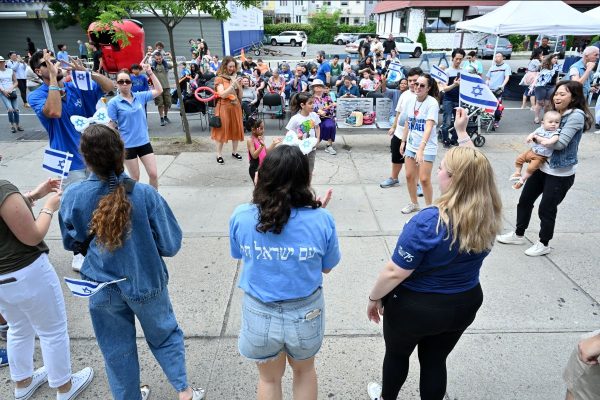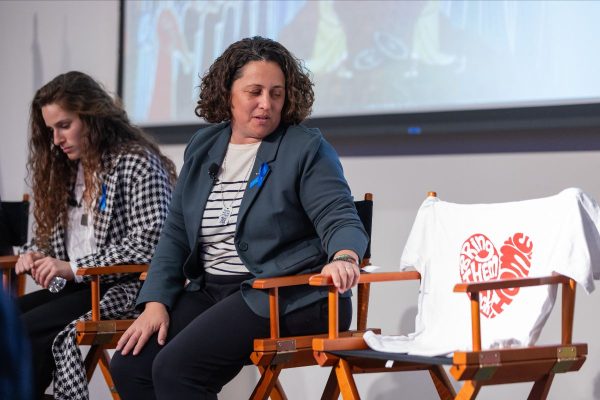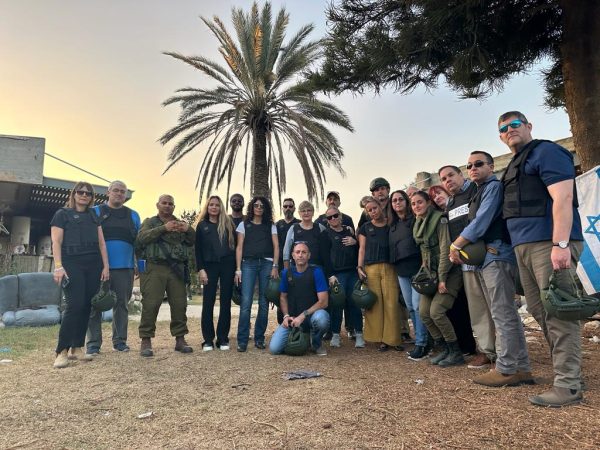By Leah Garber
“Our hope is still not lost, to be free in our land
‘Hear, O Israel,’ we are all one nation.”
— “Am Echad” (One Nation) by Ariel Zurayev
A year has passed since that black, thick, smoky Sabbath. For 367 days, the country has been covered by a gray cloud of grief and sorrow, a cloud shedding salty tears instead of showers of blessing. Twelve months in which the sun’s caressing rays have failed to penetrate the mourning veil, the overcast mist.
Three-hundred-sixty-seven days have passed, yet it’s still 6:35 a.m. on the morning of October 7, 2023. I can still hear the sirens piercing the holy silence of the holiday, and I can still sense the fear when realizing our enemies rose up to kill us all.
When I sat down that evening 12 months ago to comprehend the atrocities of the day, little did I know the scope and magnitude of the horrors, nor that bodies and souls would still bleed painfully a year later. Today.
A year has passed, and the war, the longest and harshest in our history, is still in full force.
It has been the most difficult year in the country’s history and the most painful one for me personally, as for so many others.
We inhaled shallow breaths, our laughter was apologetic, full of guilt. We could never really enjoy a fine meal, not in full. How could we when it was constantly seasoned with thoughts of what poor meals the hostages were having, if they ate all.
It was a year in which we hugged our loved ones tighter than ever, in which we held on to each other, knowing that this was the only way we would survive. It was a year in which, without words, we knew how the other felt and in which we held our country’s symbols, the flag and its Magen David, close to our hearts as a sign of our strength, determination, and resilience—because we have no other land.
With teary eyes and a broken heart, every week I shared many of the war’s horrors. I tried to share the mood of the average Israeli, the notions, fears, and pain. I did my best to portray the grief that has enveloped us since that Shabbat and tried to offer a perspective on our anxieties and frustrations—ongoing struggles for the release of the hostages, attempts to overcome disputes and hold onto our values and our hope for a better tomorrow for our children.
It’s hard to describe the feeling today, on this anniversary. In so many ways, it is no different than yesterday and the day before. No one needs a reminder of the events of October 7. The wounds are still present. They haven’t gone anywhere; they are still bleeding, and healing has yet to begin. The phantom pains of what we lost are deeper than ever. We are reminded of the 1,600 of us who were murdered, the 101 hostages who are still in the dark, our cities that were burned and gone, and the confidence in our military intelligence that has been compromised.
Still, dates matter. A one-year period measures the intensity of the destruction and the depth of pain.
But alongside the horrors, the fighting, and the hardships, this year was characterized by an immense sense of Jewish peoplehood like I’ve never experienced before.
This year, hundreds of thousands of JCC members participated in hundreds of events at JCCs across North America, standing in solidarity with Israel and the Jewish people in the face of rising antisemitism around the world. These events celebrated Jewish unity and shined a bright light upon us as we comforted one another at vigils and memorial ceremonies.

JCCs hosted survivors of the October 7 massacre, families of hostages, and artists who are commemorating the horrors through photography, music, dance, and film. Delegations of volunteers representing the JCC Movement arrived in Israel throughout the year to lend a hand, help with agriculture, visit the wounded, listen to stories of heroism, comfort bereaved parents, and witness firsthand the atrocities, before bringing their front-line perspectives into communities across the U.S. and Canada.


Above all, the funds collected by Jewish communities were unprecedented in their scope and the speed with which they were raised. I am not surprised. This is what families do, and indeed, we are a family.
In his powerful song “Am Echad“ (One Nation), poet Ariel Zurayev aims to unite us all in the aftermath of October 7. This song went viral throughout Israel and the Jewish world. With his lyrics, Ariel begs us: “Enough with the division, enough with the hatred….This is the time to love and spread hope….Because we are all brothers, not only in war. The people of Israel are a family.” I know that both the people of Israel and Jews across the world heard the calling to harness our shared values.
When hundreds of thousands of people from all over North America came to march on the Mall in Washington, D.C., in mid-November, to cry out in one loud voice: “Israel, you are not alone,” my heart skipped a beat. I saw the sights and heard the voices. I felt the strength of the message coming from across the ocean. Your clear and loud call crossed the seas and reached our hearts. We were wrapped in your embrace that came from brothers and sisters far away in body, yet never closer in spirit.
And today, on the anniversary of the events of October 7, we are all in mourning, together.
More than one hundred JCCs across the continent are hosting various commemorative events. Many are hosting Israeli artists, survivors, and bereaved families. Some JCC events will continue throughout the week, with programs for different ages and audiences. There is no community that does not mark the events of October 7, each in its own way.
Here in Israel, all radio and television broadcasts are being dedicated to the anniversary. Memorial ceremonies are being held across the country. We carry the same mournful look, sprouting from teary eyes. Today we walk a bit slower, our backs bent, and our hearts shattered into thousands of pieces.
Shards of broken hearts join with fragments from across the world and together create an endless chain of solidarity made of pain and sorrow. The sea is overflowing today, flooded with our communal tears. But this chain is formed with power, strength, and determination. This is the chain of generations who suffered and were slaughtered only for being Jewish.
When I lift my eyes and look for comfort and hope, I find it in people. In my brothers and sisters near and far.
Your support, solidarity, and dedication offered us a shoulder to lean on, a hand to wipe our tears, and an encouraging voice. יהיה בסדר | It will be fine. You are not alone.
At the end of mourning and remembrance ceremonies tonight, we will all sing, together, at the top of our lungs. עוד לא אבדה תקוותינו | Our hope is not lost yet. Am Yisrael Chai!
Together, united, we will overcome.
Leah Garber is a senior vice president of JCC Association of North America and director of its Center for Israel Engagement in Jerusalem.
Learn more about the Mit-habrim | מתחברים | Connections initiative, a partnership between JCC Association of North America and Israel’s Ministry for Diaspora Affairs set to strengthen ties between North American JCCs and Israel and demonstrate solidarity with the country following the horrific attacks of October 7.